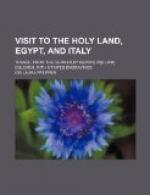The town is not lighted. Every person who goes abroad at night must take a lantern with him. If he is caught wandering without a lantern by the guard, he is taken off without mercy to the nearest watch-house, where he must pass the night. The gates of the city are shut after sunset.
In proportion as I was charmed with the beautiful situation of Constantinople, so I was disgusted with the dirt and the offensive atmosphere which prevail every where; the ugly narrow streets, the continual necessity to climb up and down steep places in the badly-paved roads, soon render the stranger weary of a residence in this city.
Worse than all is the continual dread of conflagration in which we live. Large chests and baskets are kept in readiness in every house; if a fire breaks out in the neighbourhood, all valuable articles are rapidly thrown into these and conveyed away. It is customary to make a kind of contract with two or three Turks, who are pledged, in consideration of a trifling monthly stipend, to appear in the hour of danger, for the purpose of carrying the boxes and lending a helping hand wherever they can. It is safer by far to reckon on the honesty of the Turks than on that of the Christians and Greeks. Instances in which a Turk has appropriated any portion of the goods entrusted to his care are said to be of very rare occurrence. During the first nights of my stay I was alarmed at every noise, particularly when the watchman, who paraded the streets, happened to strike with his stick upon the stones. In the event of a conflagration, he must knock at every house-door and cry, “Fire, fire!” Heaven be praised, my fears were never realised.
CHAPTER III.
Scutari—Kaiks—The howling Dervishes—The Achmaidon, or place of arrows—The tower in Galata—The Bazaar at Constantinople—Mosques— Slave-market—The old Serail—The Hippodrome—Coffee-houses—Story-tellers—Excursion to Ejub—Houses, theatres, and carriages.
I chose a Friday for an excursion to Scutari, the celebrated burying-place of the Turks, in order that I might have an opportunity of seeing the “howling dervishes.”
In company with a French physician, I traversed the Bosphorus in a kaik. {48} We passed by the “Leander’s Tower,” which stands in the sea, a few hundred paces from the Asiatic coast, and has been so frequently celebrated in song by the poets. We soon arrived at our destination.




